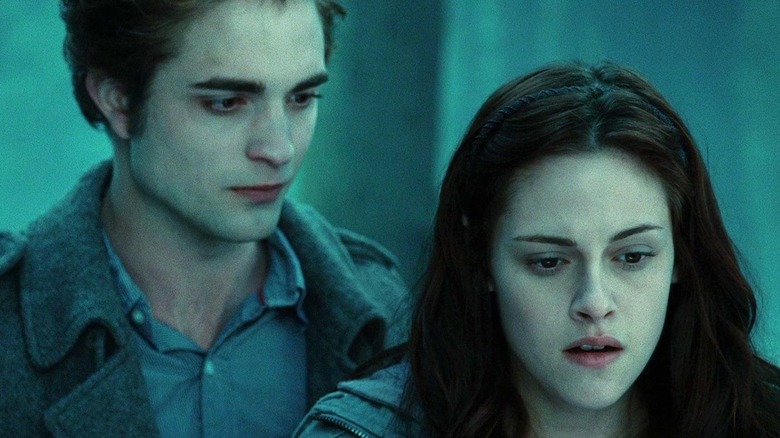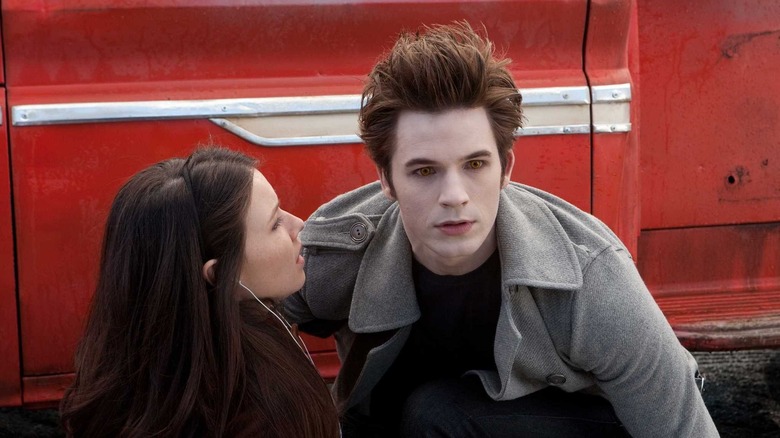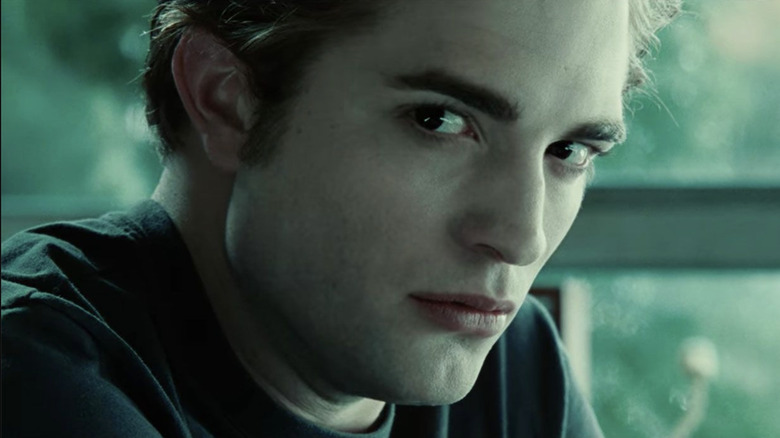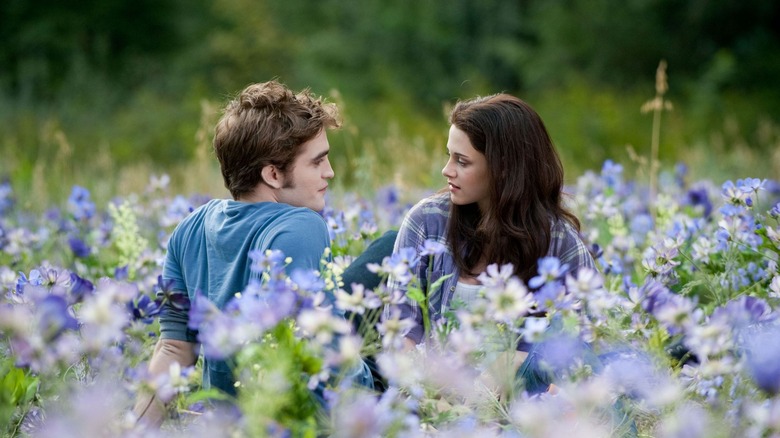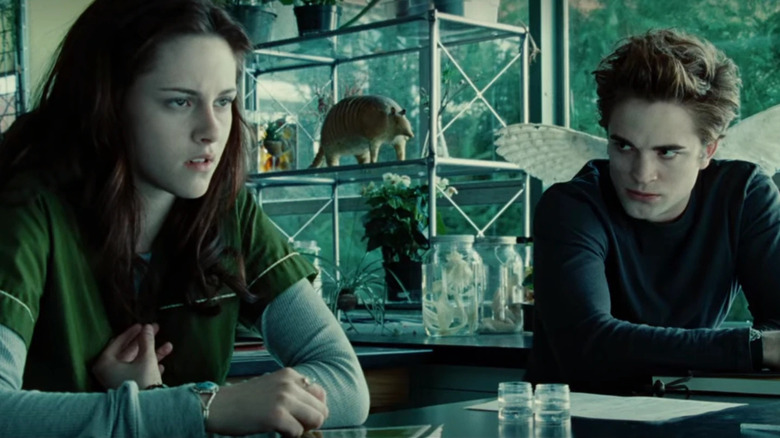The Twilight Phenomenon Was Stupid Lightning In A Stupid Bottle That No Revival Can Capture
Ahead of the possible WGA strike, Lionsgate Television has announced their latest legacy revival project is coming in the form of a series adaptation of Stephenie Meyer's vampire love story, "Twilight." The late 2000s and early 2010s have apparently never been hotter, as "Twilight" joins the reboot ranks of the previously announced "Harry Potter" series adaptation, the new "The Lord of the Rings" films, and the soon-to-be-released "The Hunger Games: The Ballad of Songbirds and Snakes" prequel film. It admittedly feels a little unfair to lump in "The Ballad of Songbirds and Snakes" with the other reboots, as "The Hunger Games" series has seen a resurgence in popularity and the film is adapting a new book, rather than rehashing what already exists.
As of publication, the "Twilight" series is without a writer or streaming home, but it'd be shocking if IP-hungry suits weren't currently trying to sink their fangs into the property. Lest we forget, the first "Twilight" made a staggering $407 million at the box office against a $37 million budget, so it's got a proven, money-making track record. Stars Robert Pattinson and Kristen Stewart have gone on to be Hollywood A-listers, but that wasn't until they tackled roles that got the so-called "Twilight" stink off of them.
But the history of the "Twilight" franchise is not as simple as that of "Harry Potter" or "The Hunger Games." The book series was extremely popular, but it was also publicly criticized every step of the way, something that "Harry Potter" wouldn't endure for almost a decade. For as many dollars that rolled in for sparkly vampire skin and a questionable romance, there were just as many people dedicating their time and energy to trashing it. I should know because I was embarrassingly one of them.
Twi-hards and Twi-haters
Explaining why rebooting "Twilight" is a fool's errand requires an understanding of the "Twilight" phenomenon in the first place, which is something a lot of people think they know, but most truly do not. The "Twilight" books were released annually from 2005 through 2008, the same year that the first film in "The Twilight Saga" was released by Summit Entertainment. Even before the film was announced, there were just as many vocal haters of the books as there were fans.
"Harry Potter" fans were constantly annoyed by the witchcraft/vampirism comparisons, and the romance plot of "Twilight" attracted a fanbase dominated by women, which meant liking "Twilight" put a target on the backs of any men who shared even a passing interest. Hating "Twilight" was seen as a cool thing to do, and plenty of people used the "Twilight" films as an excuse to express misogynistic thoughts and behaviors. People loved ragging on "Twilight" so much that it even got its own parody film in 2010, "Vampires Suck."
I, personally, have an extremely complicated history with "Twilight." I got my first professional byline writing about horror in 2009 when I was 18 years old, and a lot of gatekeeping jerks of the old guard of online film criticism loved to equate me with "Twilight," convinced that a teenage girl couldn't possibly appreciate horror unless it was of the teen-romance variety. In an insecure quest for "legitimacy" in my field, I became one of the most vocal haters of the franchise, even dedicating an entire "Twatlight" section on my now-defunct website to snarkily mocking it. The result is that I became a beacon for said misogynists to point to. A way for them to say, "See, I'm not being sexist by violently trashing this movie and its fanbase because this teen girl doesn't like it either!"
Justice for Catherine Hardwicke
The first "Twilight" film was directed by Catherine Hardwicke ("Thirteen," "Lords of Dogtown," "Mafia Mamma") but she got the gig when Hollywood didn't have any hope in the film. In a recent interview with the Los Angeles Times, Hardwicke talked about how every studio turned the project down. "I got to direct it because no one thought it would make money, and when it did, all the rest of them went to men," she said. "The rest of 'Twilight,' 'The Hunger Games,' 'Divergent,' all that model went to male directors." And Hardwicke is right. Chris Weitz, David Slade, and Bill Condon would serve as the directors of the rest of the "Twilight" saga, and Hardwicke's signature touch (like the now iconic blue filter) was stripped away.
As Twi-hards and Twi-haters grew older, there wasn't a reassessment of the story like with "Harry Potter," but instead a reassessment of how the "Twilight" films came to be. The overwhelming majority of "Twilight" fans know that the books and movies are schlock, and they're no longer fighting in defense of the material, but instead for the right to love something even if it's "bad." The truth of the matter is that people didn't hate on "Twilight" solely because it was ridiculous, but because it was ridiculous and very popular with women. Heaven forbid a massively successful franchise exists that isn't catering to an audience pool that refuses to wash their buttcrack because they're afraid it'll "make them gay." Because of this, the culture of "Twilight" has enjoyed a bit of reclamation, but the films of "Twilight" have been given an entirely different reappraisal.
(Side note: The "Twilight" commentary track is just Catherine Hardwicke telling Rob Pattinson to stop dunking on his own movie for two hours. 10/10 recommend.)
The first Twilight film is a cult classic
Yes, Edward Cullen's behavior depicts all of the textbook signs of being an abusive boyfriend. Yes, Stephenie Meyer appropriated the culture of the Quileute tribe in La Push and never compensated them for depicting them as shape-shifting werewolves. And yes, the idea of a fully adult Jacob "imprinting" on Edward and Bella's child to serve as a mentor figure until she becomes old enough to marry is unfathomably screwed up. I'm not going to laundry list the innumerable reasons why the "Twilight" series is a hot mess, because then we'd be here all day. The issues are undeniable, but the fans already know this. The reappraisal of "Twilight" has nothing to do with the actual content of the film, and everything to do with how it was depicted. Namely, in Hardwicke's first film, which has become a cult classic and pop culture mainstay.
The vampire baseball scene has been embraced for the fantastic absurdity that it is, with even the bedroom-pop singer Tessa Violet modeling her music video with lovelytheband for the song "Games" after it. Any film or TV show that uses a blue filter draws immediate comparisons to the first film, and lines like "I know what you are," "This is the skin of a killer, Bella," and "Bella! Where the hell have you been, loca?" have been memed into oblivion. Without these moments, line deliveries, or Hardwicke's directorial eye ... we're left with Stephenie Meyer's weird books about a supernatural love triangle dripping with Mormon fundamentalism that would later inspire "Fifty Shades of Grey."
(Yes, "Fifty Shades of Grey" was originally "Twilight" fanfiction. The more you know.)
Stupid lightning in a stupid bottle
While the late aughts and early 2010s weren't that long ago, the ways in which culture — especially teen culture — has evolved have been enormous. If a studio thinks Gen Z and Gen Alpha are going to put up with a story trying to romanticize Edward Cullen's stalker-ass, they're sorely mistaken, but those issues will not be the downfall of a "Twilight" reboot. Unlike a character like Batman or an expansive universe like "Star Wars," the success of "Twilight" was because Summit Entertainment captured stupid lightning in a stupid bottle, and the films have become a time capsule for an eerily specific point in a drastically changing pop culture landscape. Trying to replicate that is as ill-advised as trying to put on a live production of "The Rocky Horror Picture Show" for primetime network TV.
Look, I'm not completely writing off the "Twilight" series just yet, because I was also very against the existence of "Grease: Rise of the Pink Ladies," and the result was shockingly delightful. If Lionsgate wants to find success, they're going to need to take a dramatically different approach than what came before. I'm all for a "Twilight" series that corrects the errors of the past, but I also fear that by doing so, the nonsensical magic will be lost. I spent years of my life being actively hostile to a franchise only to become one of its strongest defenders in the scope of how Hollywood handles stories targeting non-male audiences, but I can't help but feel like the line uttered most frequently throughout the "Twilight" book series:
"I sighed."
